Jackie Baek
Hiring under Congestion and Algorithmic Monoculture: Value of Strategic Behavior
Feb 27, 2025Abstract:We study the impact of strategic behavior in a setting where firms compete to hire from a shared pool of applicants, and firms use a common algorithm to evaluate them. Each applicant is associated with a scalar score that is observed by all firms, provided by the algorithm. Firms simultaneously make interview decisions, where the number of interviews is capacity-constrained. Job offers are given to those who pass the interview, and an applicant who receives multiple offers accepts one of them uniformly at random. We fully characterize the set of Nash equilibria under this model. Defining social welfare as the total number of applicants who find a job, we then compare the social welfare at a Nash equilibrium to a naive baseline where all firms interview applicants with the highest scores. We show that the Nash equilibrium greatly improves upon social welfare compared to the naive baseline, especially when the interview capacity is small and the number of firms is large. We also show that the price of anarchy is small, providing further appeal for the equilibrium solution. We then study how the firms may converge to a Nash equilibrium. We show that when firms make interview decisions sequentially and each firm takes the best response action assuming they are the last to act, this process converges to an equilibrium when interview capacities are small. However, we show that the task of computing the best response is difficult if firms have to use its own historical samples to estimate it, while this task becomes trivial if firms have information on the degree of competition for each applicant. Therefore, converging to an equilibrium can be greatly facilitated if firms have information on the level of competition for each applicant.
When Collaborative Filtering is not Collaborative: Unfairness of PCA for Recommendations
Oct 15, 2023



Abstract:We study the fairness of dimensionality reduction methods for recommendations. We focus on the established method of principal component analysis (PCA), which identifies latent components and produces a low-rank approximation via the leading components while discarding the trailing components. Prior works have defined notions of "fair PCA"; however, these definitions do not answer the following question: what makes PCA unfair? We identify two underlying mechanisms of PCA that induce unfairness at the item level. The first negatively impacts less popular items, due to the fact that less popular items rely on trailing latent components to recover their values. The second negatively impacts the highly popular items, since the leading PCA components specialize in individual popular items instead of capturing similarities between items. To address these issues, we develop a polynomial-time algorithm, Item-Weighted PCA, a modification of PCA that uses item-specific weights in the objective. On a stylized class of matrices, we prove that Item-Weighted PCA using a specific set of weights minimizes a popularity-normalized error metric. Our evaluations on real-world datasets show that Item-Weighted PCA not only improves overall recommendation quality by up to $0.1$ item-level AUC-ROC but also improves on both popular and less popular items.
Policy Optimization for Personalized Interventions in Behavioral Health
Mar 21, 2023



Abstract:Problem definition: Behavioral health interventions, delivered through digital platforms, have the potential to significantly improve health outcomes, through education, motivation, reminders, and outreach. We study the problem of optimizing personalized interventions for patients to maximize some long-term outcome, in a setting where interventions are costly and capacity-constrained. Methodology/results: This paper provides a model-free approach to solving this problem. We find that generic model-free approaches from the reinforcement learning literature are too data intensive for healthcare applications, while simpler bandit approaches make progress at the expense of ignoring long-term patient dynamics. We present a new algorithm we dub DecompPI that approximates one step of policy iteration. Implementing DecompPI simply consists of a prediction task from offline data, alleviating the need for online experimentation. Theoretically, we show that under a natural set of structural assumptions on patient dynamics, DecompPI surprisingly recovers at least 1/2 of the improvement possible between a naive baseline policy and the optimal policy. At the same time, DecompPI is both robust to estimation errors and interpretable. Through an empirical case study on a mobile health platform for improving treatment adherence for tuberculosis, we find that DecompPI can provide the same efficacy as the status quo with approximately half the capacity of interventions. Managerial implications: DecompPI is general and is easily implementable for organizations aiming to improve long-term behavior through targeted interventions. Our case study suggests that the platform's costs of deploying interventions can potentially be cut by 50%, which facilitates the ability to scale up the system in a cost-efficient fashion.
Fair Exploration via Axiomatic Bargaining
Jun 04, 2021

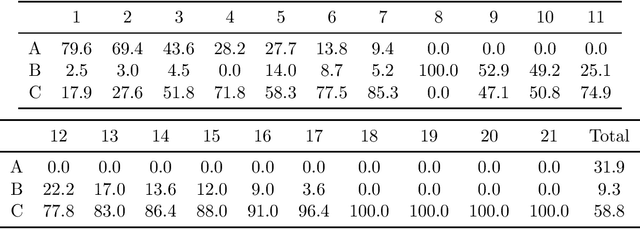
Abstract:Motivated by the consideration of fairly sharing the cost of exploration between multiple groups in learning problems, we develop the Nash bargaining solution in the context of multi-armed bandits. Specifically, the 'grouped' bandit associated with any multi-armed bandit problem associates, with each time step, a single group from some finite set of groups. The utility gained by a given group under some learning policy is naturally viewed as the reduction in that group's regret relative to the regret that group would have incurred 'on its own'. We derive policies that yield the Nash bargaining solution relative to the set of incremental utilities possible under any policy. We show that on the one hand, the 'price of fairness' under such policies is limited, while on the other hand, regret optimal policies are arbitrarily unfair under generic conditions. Our theoretical development is complemented by a case study on contextual bandits for warfarin dosing where we are concerned with the cost of exploration across multiple races and age groups.
The Limits to Learning an SIR Process: Granular Forecasting for Covid-19
Jun 11, 2020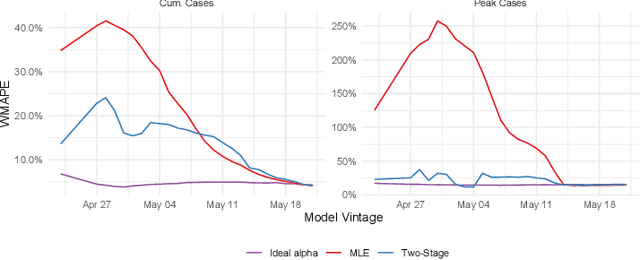
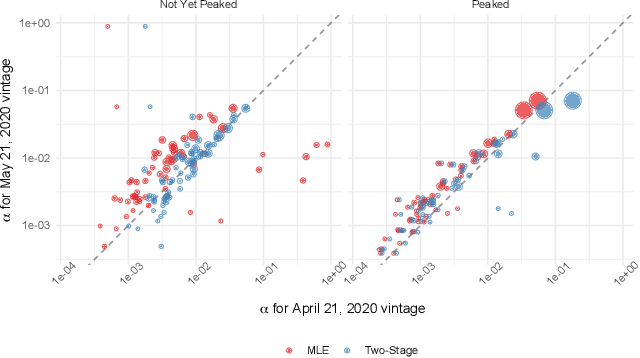
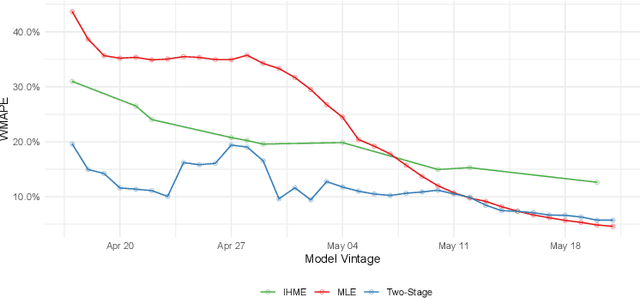
Abstract:A multitude of forecasting efforts have arisen to support management of the ongoing COVID-19 epidemic. These efforts typically rely on a variant of the SIR process and have illustrated that building effective forecasts for an epidemic in its early stages is challenging. This is perhaps surprising since these models rely on a small number of parameters and typically provide an excellent retrospective fit to the evolution of a disease. So motivated, we provide an analysis of the limits to estimating an SIR process. We show that no unbiased estimator can hope to learn this process until observing enough of the epidemic so that one is approximately two-thirds of the way to reaching the peak for new infections. Our analysis provides insight into a regularization strategy that permits effective learning across simultaneously and asynchronously evolving epidemics. This strategy has been used to produce accurate, granular predictions for the COVID-19 epidemic that has found large-scale practical application in a large US state.
TS-UCB: Improving on Thompson Sampling With Little to No Additional Computation
Jun 11, 2020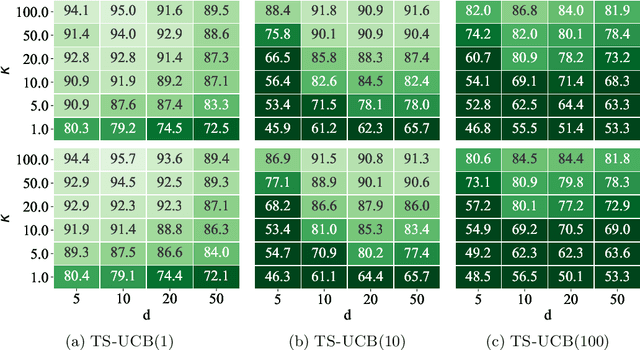
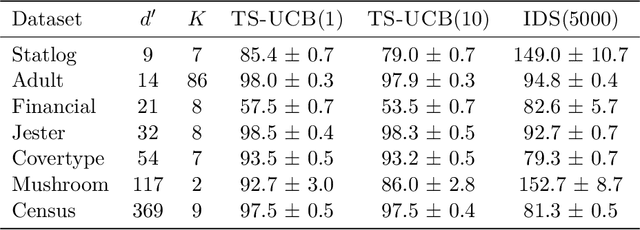
Abstract:Thompson sampling has become a ubiquitous approach to online decision problems with bandit feedback. The key algorithmic task for Thompson sampling is drawing a sample from the posterior of the optimal action. We propose an alternative arm selection rule we dub TS-UCB, that requires negligible additional computational effort but provides significant performance improvements relative to Thompson sampling. At each step, TS-UCB computes a score for each arm using two ingredients: posterior sample(s) and upper confidence bounds. TS-UCB can be used in any setting where these two quantities are available, and it is flexible in the number of posterior samples it takes as input. This proves particularly valuable in heuristics for deep contextual bandits: we show that TS-UCB achieves materially lower regret on all problem instances in a deep bandit suite proposed in Riquelme et al. (2018). Finally, from a theoretical perspective, we establish optimal regret guarantees for TS-UCB for both the K-armed and linear bandit models.
 Add to Chrome
Add to Chrome Add to Firefox
Add to Firefox Add to Edge
Add to Edge